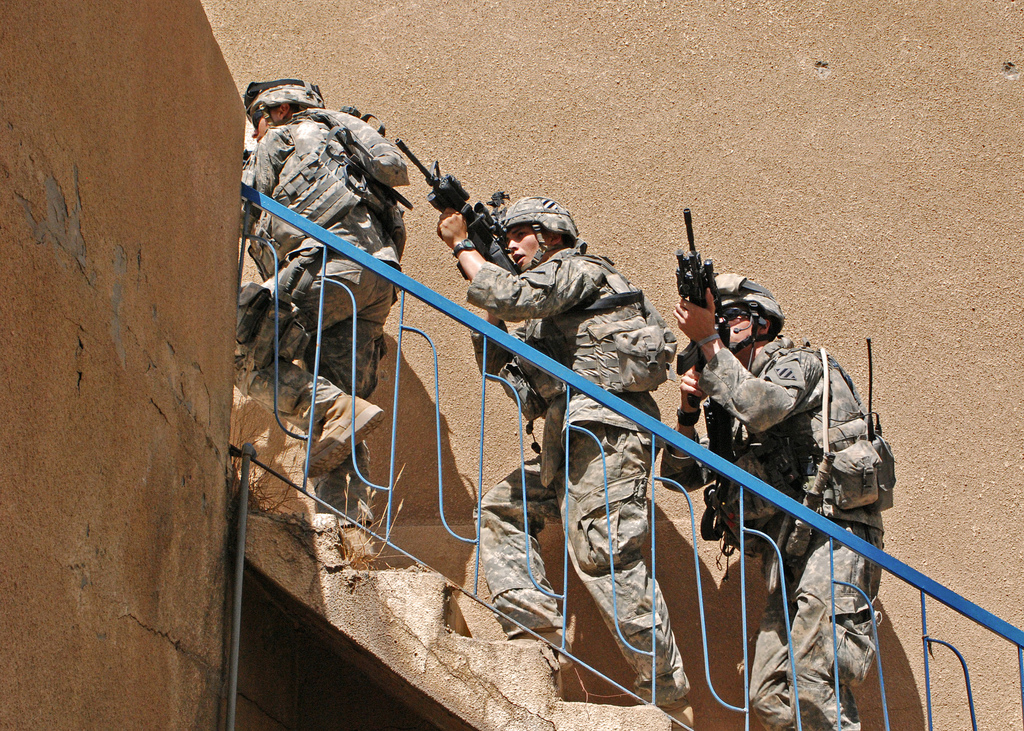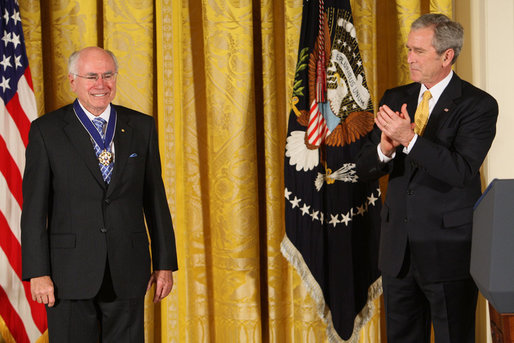Nothing Found
Sorry, no posts matched your criteria
Sorry, no posts matched your criteria
 Peter Jennings’ post ‘America: big fires grow from small ones’ has sparked debate (here and here) but appears to have gone unremarked by readers of The Strategist, despite touching on numerous issues.
Peter Jennings’ post ‘America: big fires grow from small ones’ has sparked debate (here and here) but appears to have gone unremarked by readers of The Strategist, despite touching on numerous issues.
Peter’s not a great supporter of President Obama’s latest remarks on national security, which he sees as placing too high a threshold on America’s intention to use military power. Consequently, Peter fears that most of the international order (and particularly America’s ‘frenemies’) will assume there’s little prospect of the US actually using military force, the more so because there has been no US combat response to the capture of Mosul by the jihadist group ISIS and its subsequent advances in Iraq.
Yet in America’s use of hard power since the mid-20th century, and in the outcomes of that use, the semantics of declaratory policy seem to have been of less import than the interaction of historical circumstances. Read more
 After last week’s post on Lanchester equations and the applications of mathematics to warfare, I was asked several questions by interested readers. Is there a version of this analysis for counter-insurgency (COIN)? How useful are these models given the acknowledged simplification behind them? Why don’t I get out more?
After last week’s post on Lanchester equations and the applications of mathematics to warfare, I was asked several questions by interested readers. Is there a version of this analysis for counter-insurgency (COIN)? How useful are these models given the acknowledged simplification behind them? Why don’t I get out more?
The third question is beyond the scope of this post, but after some thought and some (rusty) algebra, I think I can answer the first, and shed some light on the second in the process.
In COIN operations, there’s an inherent asymmetry between the two sides that has to be captured by the mathematical model. The way I thought about it, the COIN (blue) forces basically present themselves as an area target as they spread over the landscape, allowing the insurgents to attack at a time and place of their choosing. So the blue force losses depend on both the number of blues and the number of insurgents (red), and the appropriate equation for blue losses is Lanchester’s ‘unaimed fire’ equation (although the term ‘unaimed’ isn’t accurate in this case). The red forces, on the other hand, have to be treated as precision ‘point’ targets that have to be precisely located and engaged. Their losses should be described by the ‘aimed fire’ equation. (See the appendix below if you want the grisly details.) Read more
At the risk of testing the patience of Strategist readers I think a brief reply is in order to Derek Woolner’s post on the Iraq war anniversary. A point of contention between Derek’s post, Graeme Dobell’s offerings (here and here) and my reply has been about the role of the public service and the claim that key advisers were ‘silent’ in making the case against against the war. This seems to imply that there was a deep wellspring of opposition to the war in the public service and therefore a failure on the part of officials not to bring their opposition to the government’s attention.
The reality of the situation is actually well captured by The Australian’s Paul Kelly in the article cited by Derek. A few lines after Ashton Calvert’s comments quoted by Derek we read:
Calvert, who died in 2007, and [then Defence Secretary Ric] Smith made clear the current generation [of officials] had not opposed the war. Calvert said: “I personally was satisfied with their (Howard and Downer) strategic judgment on Australia’s commitment.
Mr Smith said: “I think the key officials involved felt an Australian commitment was right. I was not aware of any senior official advising against it in my time. We accepted the advice on WMD and understood the alliance’s interests that were involved, although there was continuing concern about the state of planning for ‘phase four’ (after Saddam Hussein’s fall).
 Graeme Dobell makes some contentious arguments about Australia’s decision-making processes when determining our involvement in the American-led Iraq war of ten years ago. They are contentious because many of Canberra’s mandarins remain in place, people still argue passionately over whether the removal of Saddam Hussein was worth the cost in blood and treasure and Iraq remains a confusingly bloody work-in-progress, even on a weekly basis. At this point though, two useful lessons for future policymaking might be discerned: the utility of US provided intelligence to Australian decision-making and the need for us to be less Australia-centric when thinking about the alliance.
Graeme Dobell makes some contentious arguments about Australia’s decision-making processes when determining our involvement in the American-led Iraq war of ten years ago. They are contentious because many of Canberra’s mandarins remain in place, people still argue passionately over whether the removal of Saddam Hussein was worth the cost in blood and treasure and Iraq remains a confusingly bloody work-in-progress, even on a weekly basis. At this point though, two useful lessons for future policymaking might be discerned: the utility of US provided intelligence to Australian decision-making and the need for us to be less Australia-centric when thinking about the alliance.
A major benefit of the alliance is held to be the access gained to American intelligence. Undoubtedly the US has an unmatched information collection system of enormous sophistication, but that shouldn’t be interpreted as meaning the intelligence provided is infallible. Indeed in moments of crisis such as the lead up to war the US intelligence system can be inaccurate—as the Iraq WMD case amply demonstrates.
During the Cuban Missile Crisis, US intelligence missed that the Soviet forces already deployed to the island had some 100 tactical nuclear weapons. The US Joint Chiefs were recommending a large-scale invasion of Cuba preceded by extensive airstrikes (PDF); if the intelligence had been acted on, the result might have been disastrous. At the time, US intelligence believed that the 1964 Gulf of Tonkin incident happened but it’s now clear that it didn’t—the incident that was crucial in leading to full-scale US involvement in the Vietnam War never occurred. (For the detailed signals intelligence analysis, see here (PDF).) Later in the war, the intelligence community failed to warn of the 1968 Tet Offensive that delivered a serious blow to America’s continued commitment. And, of course, ten years ago, the Iraq war’s main rationale, that of ‘the clear and present danger’ from Saddam’s WMD, proved illusionary. Read more
 Graeme Dobell’s contributions are always entertaining and frequently insightful, which makes it forgivable if now and again his arguments are well wide of the mark. We had one such moment with his piece reflecting on the decision to go to war in Iraq in 2003, where he slams the public service for its passivity and silence in failing to oppose the war and indeed doing ‘… a worse job of confronting the issues than did their predecessors during the lousy processes that sent Australia off to Vietnam’. That’s a remarkably harsh judgement, and one informed with the benefit of hindsight unavailable to the original decision makers or their advisers. It overstates what might reasonably be expected of public servants in advising Cabinet and undersells the deliberations that actually took place.
Graeme Dobell’s contributions are always entertaining and frequently insightful, which makes it forgivable if now and again his arguments are well wide of the mark. We had one such moment with his piece reflecting on the decision to go to war in Iraq in 2003, where he slams the public service for its passivity and silence in failing to oppose the war and indeed doing ‘… a worse job of confronting the issues than did their predecessors during the lousy processes that sent Australia off to Vietnam’. That’s a remarkably harsh judgement, and one informed with the benefit of hindsight unavailable to the original decision makers or their advisers. It overstates what might reasonably be expected of public servants in advising Cabinet and undersells the deliberations that actually took place.
I’m sure it was the case that some senior public servants opposed going to war—as did a fair chunk of the population—but many in the national security community would also have backed the decision. There was no gulf of silence between the bureaucracy and Government, but more a shared acceptance of the dimension of the problem and the likely end point.
It might be correct to say that there was no specific cabinet paper arguing the pros and cons of involvement in the Iraq war, but there was a very substantial flow of reporting to government: intelligence judgements on Saddam’s weapons of mass destruction programs; diplomatic reporting about efforts to get Iraq to be more transparent on its weapons plans and on manoeuvres at the UN; military reporting on US and allied preparations and on the likely opposition. These were the issues around which there was intense public debate and public service policy work. In his autobiography, Lazarus Rising, John Howard acknowledges a failure on the part of the occupying powers not to think through the military requirements of the post-invasion phase. That was clearly a profound mistake, but hardly one on which Australia was alone. Read more
Australia’s politicians stood up and took both bows and bruises for their stance on the Iraq war. John Howard promised he wouldn’t recant on the Iraq war, just as he wouldn’t recant on Vietnam. He’s been true to that pledge.
Labor’s leader at the time of the Iraq war, Simon Crean, got kicked brutally for saying that Australia shouldn’t follow the US into the conflict. Now Crean’s speeches look as prescient as those of Arthur Calwell’s in opposing Vietnam—and politically, of course, taking those stances helped to damn both Crean and Calwell. Being right too early in politics can be as damaging as being wrong.
To go back down the time tunnel, here are the Iraq war speeches made by Prime Minister Howard and Opposition Leader Crean when Parliament assembled in February, 2003. Howard had the numbers on the day but Crean gets history’s vote.
Kevin Rudd had the fortune to be able to pin the Iraq war on Howard when the scale of the disaster had become apparent. Rudd could argue that Iraq was the wrong war: Australia would withdraw and concentrate on Afghanistan. Rudd’s case was that Australia could exit Iraq but hold firm to the US alliance. Read more